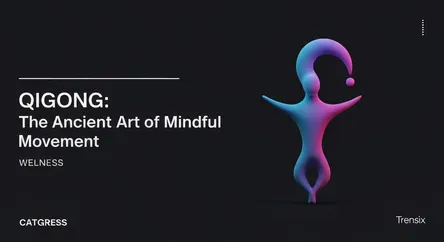Wellness
Qigong: The Ancient Art of Mindful Movement

Discover Qigong, the ancient Chinese practice of coordinated movement, breathing, and meditation to enhance well-being and reduce stress.
What is it?
Qigong is a centuries-old practice rooted in Traditional Chinese Medicine that combines slow, deliberate movements, deep breathing exercises, and meditation. Pronounced "chi-gong," the name translates to "working with life energy." The core belief of Qigong is the cultivation and balancing of "qi," or the body's vital life force. The practice aims to ensure that this energy flows freely through the body's energy channels, known as meridians. Unlike more strenuous exercises, Qigong is low-impact and can be adapted for people of all ages and fitness levels, including those recovering from injuries.
Why is it trending?
Qigong's rising popularity is linked to the growing global interest in mindfulness and holistic wellness practices. As people seek ways to manage the stresses of modern life, Qigong offers an accessible and gentle approach to connect the mind and body. Often referred to as "the next yoga," its focus on internal energy and fluid movements appeals to those looking for a less physically demanding alternative. Furthermore, increasing scientific research into its potential health benefits, along with its accessibility through online videos and classes, has made the practice more mainstream.
How does it affect people?
Practitioners of Qigong report a wide range of physical and mental health benefits. Regular practice is associated with reduced stress, anxiety, and symptoms of depression. Physically, it can improve balance, flexibility, and muscle strength. Studies have also suggested positive effects on chronic conditions, showing it may help manage pain from fibromyalgia, lower high blood pressure, and improve quality of life for individuals with various health issues. By promoting a state of calm and focused awareness, Qigong helps individuals cultivate a greater sense of overall well-being and inner peace.